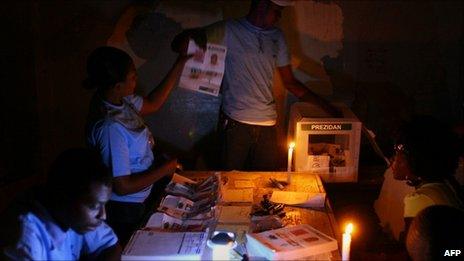Counting under way in Haiti's delayed presidential poll
- Published

Power cuts meant many electoral workers had to count by candlelight
Counting is under way after Haiti's delayed presidential run-off passed off largely peacefully.
UN observers and Haitian election officials said turnout appeared to be larger than the chaotic first round, which was marred by violence and fraud.
Voters had a choice between pop star Michel Martelly and academic and former First Lady Mirlande Manigat.
Preliminary results are expected on 31 March with final results not set to be confirmed until 16 April.
Whoever wins will face a huge challenge as Haiti struggles to rebuild after the January 2010 earthquake and to cope with a cholera epidemic.
The race between Mr Martelly and Mrs Manigat looks set to be close.
There are concerns that the long wait for the results could add to tensions, but Haiti's Provisional Electoral Council (CEP) said that the two candidates had agreed not to make any declaration of victory or hold rallies until the first results were announced.
Two shot dead
Voting day itself appeared to be a big improvement in terms of organisation and turnout on November's first round, when only 23% of voters cast their ballots.
"I've seen a lot of differences compared to 28 November. Participation is greater," said Edmond Mulet, head of the UN peacekeeping mission Minustah.
Election day was also much calmer, although Haitian police chief Mario Andresol said two people were shot dead in clashes between rival political factions in different rural areas.
There had been fears that the return of former President Jean-Bertrand Aristide after seven years in exile in South Africa would destabilise the vote.
After arriving in Haiti on Friday, he criticised the exclusion of his party, Fanmi Lavalas, from the elections, which are also for the country's legislature.
After delays at some poling stations caused by missing voting materials, the CEP extended voting by an hour.
But the CEP head, Gaillot Dorsinvil, said reports of irregularities would have "no impact on the electoral process as a whole".
He also said there had been a larger turnout.
"In a democratic way the Haitian people fulfilled their obligation by voting massively and made their choice," Mr Dorsinvil said.
Twin tasks
But for some of the people still living in tent camps more than a year after the earthquake, the election seemed a pointless exercise.
"What for? Nobody helps us," one of the camp residents, Francine, told AFP.
Helping the Haitian people and reassuring international donors are two huge challenges facing either Mr Martelly or Mrs Manigat.
Some 800,000 people are still housed in temporary camps as Haiti struggles to rebuild in the wake of the devastating quake.
The country has also been suffering a cholera epidemic that is likely to flare up again with the start of the rainy season in a few weeks.
International donors are looking for the next president to help restore some stability and be a partner they can work with.
- Published8 February 2012
- Published20 March 2011
- Published16 March 2011
- Published3 March 2011